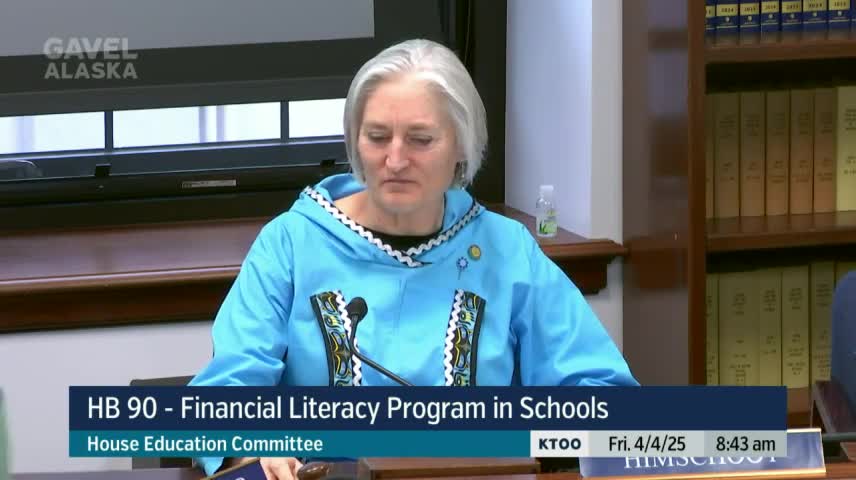CERC tells Alaska education committee it provides maintenance systems, special‑education services and CIP support to small districts
Get AI-powered insights, summaries, and transcripts
Subscribe
Summary
CERC told the House Education Committee that it provides a package of services to smaller and rural Alaska districts — including a computerized maintenance management system, special‑education related services, grant support and project administration for major maintenance and school construction.
Juneau — Alaska’s cooperative educational resource center known in the hearing as CERC presented its statewide roles on April 4, telling the House Education Committee that it provides adult education, vocational training, special‑education related services, technology and business support for small districts, and a facilities program that helps districts manage maintenance and apply for state CIP and major‑maintenance grants.
"Our mission is to deliver high quality educational services, and personalized resources to meet the diverse needs of all Alaskans," CERC Executive Director Chris Raiton said during the presentation. He described the organization as governed by an 18‑member board made up of Southeast Alaska superintendents and noted CERC’s role as a contract service provider for smaller or remote districts.
Services described: CERC staff said their two primary program areas are adult education/vocational training (including GED, ESL and MAS—Mature Alaskans Seeking Skills programs) and services for school districts. District services cited at the hearing included special‑education related services (speech/language, occupational and physical therapy, school psychologists), technology and PowerSchool support, business management, E‑rate application assistance, grant management, academic programs such as Academic Decathlon, and workforce/trades training in partnership with the University of Alaska Southeast.
Facilities and CMMS work: CERC’s facilities program manager described a statewide Computerized Maintenance Management System (CMMS) the agency hosts (Maintenance Connection, an Accruent product) and said CERC currently holds CMMS subscriptions or records for roughly 25 school districts. The presentation stressed CMMS as a planning and grant‑application tool that documents work orders, materials and labor and supports major maintenance grant scoring and project planning.
Capacity and workload statistics: CERC staff gave several contract and workload counts: 25 CMMS contracts, 45 major maintenance grant applications developed in the current year, 23 E‑rate applications, 13 districts receiving special‑education related services through CERC, nine districts receiving AHEC (Area Health Education Consortium) services, and two districts with business management contracts. They said they managed 18 school construction grant applications and had six active project‑administration agreements at the time of the hearing. CERC also reported it developed 39 of 84 rated projects on the most recent major maintenance priority list.
Unscheduled work and emergency needs: CERC staff described large volumes of unscheduled maintenance needs reported into their system. Program staff said their CMMS shows more than 32,800 non‑preventative maintenance work orders since 2018, representing roughly 216,000 work hours and costs they estimated at over $19.5 million for the districts tracked — figures CERC presented as reflective of reported activity in the system. “Those projects are simply put on the CIP list,” said David Landis, a facility specialist with CERC, about emergency failures; he added that there is not a separate statewide emergency fund for most of these repairs unless a building is catastrophically destroyed or federal disaster funds apply.
How CERC helps districts apply for CIP: CERC staff said they work with districts from early planning through closeout, offering condition surveys, RFP support, procurement assistance, project administration, and help with reimbursement paperwork where districts are eligible. They said an initial CERC application package for a CIP/major maintenance request generally costs districts in the low‑thousands of dollars (CERC estimated roughly $2,000–$3,000 per application for its services), while condition surveys or full design work — which CERC encourages districts to have available — can cost substantially more (tens of thousands of dollars to six figures depending on scope).
Regulatory and asbestos work: CERC staff described providing AHERA (Asbestos Hazard Emergency Response Act) reinspection and management support that districts must carry out on multi‑year cycles, and they said they help districts maintain required documentation and public‑awareness materials.
Questions from committee members: Lawmakers praised CERC’s services but asked whether CERC and DEED should do more to standardize reporting and help districts that do not participate in the CIP cycle. Committee members asked whether the state or resource centers should employ on‑call engineers or architects to help smaller districts with condition surveys and design work; CERC staff said the idea has been discussed internally and with DEED but that funding and statutory design would need to be resolved. Staff also said some districts fund projects internally (for example, the North Slope Borough) and thus may not appear on the state list.
Context and next steps: Committee members noted the scale of deferred maintenance across rural Alaska, rising costs, and the limits of insurance and district budgets to absorb catastrophic failures. CERC staff said they will continue coordinating with DEED, districts, and the committee to explore options for improving planning, reporting and access to needed design and assessment services. No formal action or votes followed the presentation; the committee moved on to other agenda business.
